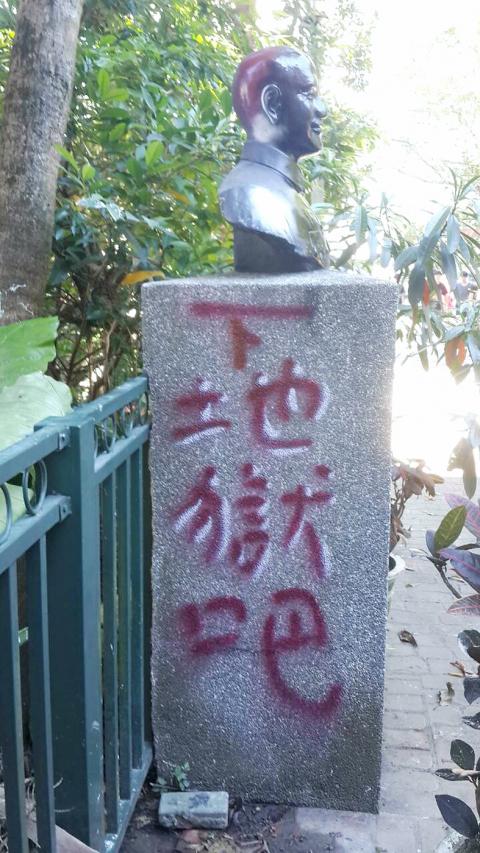Keelung police are investigating the defacement of two statues of former president Chiang Kai-shek (蔣介石) in Zhongzheng Park with graffiti.
A city cleaning crew discovered the vandalism yesterday morning.
A statue of Chiang in a military uniform located near the entrance to Zhupu Temple was marked by the Chinese characters for “bandit,” “give back my land” and “Shame[ful] PLAY,” police said.

Photo: Lu Hsien-hsiu, Taipei Times
The statue’s face had been covered with paint and its shoes were painted red, police said.
There is reportedly a folk myth that those who wear red shoes will not be reincarnated, but a Taoist practitioner surnamed Wu (吳) said he had not heard of such a saying.
Wu said painting the statue’s shoes red was aimed at ridiculing and shaming Chiang, Wu said.
A bust of Chiang near the stairs to the Martyrs’ Shrine in the park, had the characters reading “go to hell,” “blood for blood” and “murderer” spray painted on it, police said.
The cleaning crew was making a routine round of the park when it discovered the graffiti, Keelung Public Works Bureau official Huang Yi-wei (黃毅維) said.
We have tried to wash most of the spraypaint off and have repainted parts of the statue with black paint, Huang said.
The police said that they are reviewing the CCTV footage from inside the park and the surrounding areas, adding that they have a few suspects they plan to investigate.
The bureau said the statue near the Martyrs’ Shrine was erected after the building was converted from a Japanese shrine in 1972, but it did not know when the larger statue by the Zhupu Temple had been put up.

CHANGING LANDSCAPE: Many of the part-time programs for educators were no longer needed, as many teachers obtain a graduate degree before joining the workforce, experts said Taiwanese universities this year canceled 86 programs, Ministry of Education data showed, with educators attributing the closures to the nation’s low birthrate as well as shifting trends. Fifty-three of the shuttered programs were part-time postgraduate degree programs, about 62 percent of the total, the most in the past five years, the data showed. National Taiwan Normal University (NTNU) discontinued the most part-time master’s programs, at 16: chemistry, life science, earth science, physics, fine arts, music, special education, health promotion and health education, educational psychology and counseling, education, design, Chinese as a second language, library and information sciences, mechatronics engineering, history, physical education

The High Prosecutors’ Office yesterday withdrew an appeal against the acquittal of a former bank manager 22 years after his death, marking Taiwan’s first instance of prosecutors rendering posthumous justice to a wrongfully convicted defendant. Chu Ching-en (諸慶恩) — formerly a manager at the Taipei branch of BNP Paribas — was in 1999 accused by Weng Mao-chung (翁茂鍾), then-president of Chia Her Industrial Co, of forging a request for a fixed deposit of US$10 million by I-Hwa Industrial Co, a subsidiary of Chia Her, which was used as collateral. Chu was ruled not guilty in the first trial, but was found guilty

DEADLOCK: As the commission is unable to forum a quorum to review license renewal applications, the channel operators are not at fault and can air past their license date The National Communications Commission (NCC) yesterday said that the Public Television Service (PTS) and 36 other television and radio broadcasters could continue airing, despite the commission’s inability to meet a quorum to review their license renewal applications. The licenses of PTS and the other channels are set to expire between this month and June. The National Communications Commission Organization Act (國家通訊傳播委員會組織法) stipulates that the commission must meet the mandated quorum of four to hold a valid meeting. The seven-member commission currently has only three commissioners. “We have informed the channel operators of the progress we have made in reviewing their license renewal applications, and

Taiwan-based publisher Li Yanhe (李延賀) has been sentenced to three years in prison, fined 50,000 yuan (US$6,890) in personal assets and deprived political rights for one year for “inciting secession” in China, China's Taiwan Affairs Office spokesman Chen Binhua (陳斌華) said today. The Shanghai First Intermediate People’s Court announced the verdict on Feb. 17, Chen said. The trial was conducted lawfully, and in an open and fair manner, he said, adding that the verdict has since come into legal effect. The defendant reportedly admitted guilt and would appeal within the statutory appeal period, he said, adding that the defendant and his family have